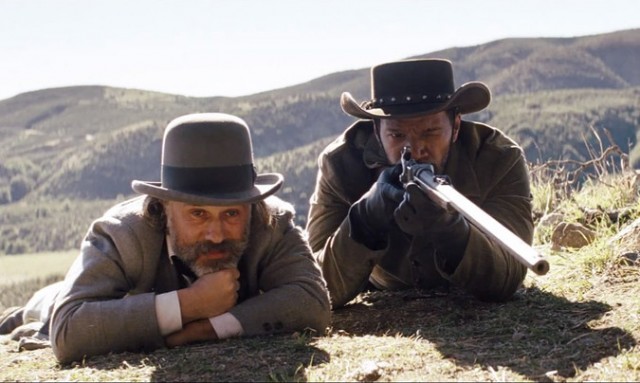
Oscar winners Christoph Waltz and Jamie Foxx spot a target in Quentin Tarantino’s wild take on the spaghetti Western
DJANGO UNCHAINED (Quentin Tarantino, 2012)
Opened Tuesday, December 25
www.unchainedmovie.com
 Multigenre master Quentin Tarantino, who as writer-director has taken on the gangster film (Reservoir Dogs), pulp movies (Pulp Fiction), Blaxploitation (Jackie Brown), the martial arts (Kill Bill, Vols. I & II), grindhouse (Death Proof), and WWII (Inglourious Basterds) with nearly universally acclaimed results, has now turned his attention to the spaghetti Western, resulting in yet another awesome achievement. A Southern Western that in many ways is the black version of Inglourious Basterds, Django Unchained is set immediately before the Civil War, as bounty hunter and former dentist King Schultz (Oscar winner Christoph Waltz) obtains a slave named Django (Oscar and Grammy winner Jamie Foxx) in order to track down the wanted Brittle brothers (Cooper Huckabee, Doc Duhame, and M. C. Gainey) and collect a substantial reward. Schultz has promised Django his freedom and some cash in return for his assistance, but the two stick together as they go off in search of Django’s wife, Broomhilda Von Shaft (Kerry Washington), who was brutally taken away from him and now works on the Candyland plantation owned by the slick, smooth Calvin J. Candie (Leonardo DiCaprio) and run by an Uncle Tom slave known as Stephen (Samuel L. Jackson). As with most Tarantino films, things get a little violent by the end, an operatic barrage of blood and guts that would make Sam Peckinpah proud. Tarantino, who appeared in Takashi Miike’s 2007 Sukiyaki Western Django and plays a small part here as well, continues his reign as the King of the Revenge Film with Django Unchained, another movie that is, at its heart, another celebration of movies themselves. Tarantino masterfully toys with cinematic conventions, tongue often firmly in cheek, evoking a stream of Western classics, including The Wild Bunch, The Searchers, Blazing Saddles, and, of course, Sergio Corbucci’s 1966 Django — he even gives a small part to Franco Nero, who played the title role in the Corbucci flick. Tarantino also adds beautifully absurd humor, primarily in the form of a riotous scene with masked marauders, a perhaps overly liberal use of the N-word, a vast array of familiar faces rounding out the cast (Don Johnson, Dennis Christopher, Bruce Dern, Tom Wopat, James Russo, Jonah Hill, Robert Carradine, and James Remar inexplicably in two roles), and, as usual, a killer soundtrack, ranging from new music by Ennio Morricone, John Legend, and Anthony Hamilton to a spectacularly out-of-place song by the late Jim Croce. He even references German literature in the form of the famous myth of Siegfried and Brunhilde. Yes, the film is too long, too violent, and too filled with stereotypes, and the story comes together a little too easily, but heck, it’s still about as much fun as you’re gonna have at the movies this year.
Multigenre master Quentin Tarantino, who as writer-director has taken on the gangster film (Reservoir Dogs), pulp movies (Pulp Fiction), Blaxploitation (Jackie Brown), the martial arts (Kill Bill, Vols. I & II), grindhouse (Death Proof), and WWII (Inglourious Basterds) with nearly universally acclaimed results, has now turned his attention to the spaghetti Western, resulting in yet another awesome achievement. A Southern Western that in many ways is the black version of Inglourious Basterds, Django Unchained is set immediately before the Civil War, as bounty hunter and former dentist King Schultz (Oscar winner Christoph Waltz) obtains a slave named Django (Oscar and Grammy winner Jamie Foxx) in order to track down the wanted Brittle brothers (Cooper Huckabee, Doc Duhame, and M. C. Gainey) and collect a substantial reward. Schultz has promised Django his freedom and some cash in return for his assistance, but the two stick together as they go off in search of Django’s wife, Broomhilda Von Shaft (Kerry Washington), who was brutally taken away from him and now works on the Candyland plantation owned by the slick, smooth Calvin J. Candie (Leonardo DiCaprio) and run by an Uncle Tom slave known as Stephen (Samuel L. Jackson). As with most Tarantino films, things get a little violent by the end, an operatic barrage of blood and guts that would make Sam Peckinpah proud. Tarantino, who appeared in Takashi Miike’s 2007 Sukiyaki Western Django and plays a small part here as well, continues his reign as the King of the Revenge Film with Django Unchained, another movie that is, at its heart, another celebration of movies themselves. Tarantino masterfully toys with cinematic conventions, tongue often firmly in cheek, evoking a stream of Western classics, including The Wild Bunch, The Searchers, Blazing Saddles, and, of course, Sergio Corbucci’s 1966 Django — he even gives a small part to Franco Nero, who played the title role in the Corbucci flick. Tarantino also adds beautifully absurd humor, primarily in the form of a riotous scene with masked marauders, a perhaps overly liberal use of the N-word, a vast array of familiar faces rounding out the cast (Don Johnson, Dennis Christopher, Bruce Dern, Tom Wopat, James Russo, Jonah Hill, Robert Carradine, and James Remar inexplicably in two roles), and, as usual, a killer soundtrack, ranging from new music by Ennio Morricone, John Legend, and Anthony Hamilton to a spectacularly out-of-place song by the late Jim Croce. He even references German literature in the form of the famous myth of Siegfried and Brunhilde. Yes, the film is too long, too violent, and too filled with stereotypes, and the story comes together a little too easily, but heck, it’s still about as much fun as you’re gonna have at the movies this year.